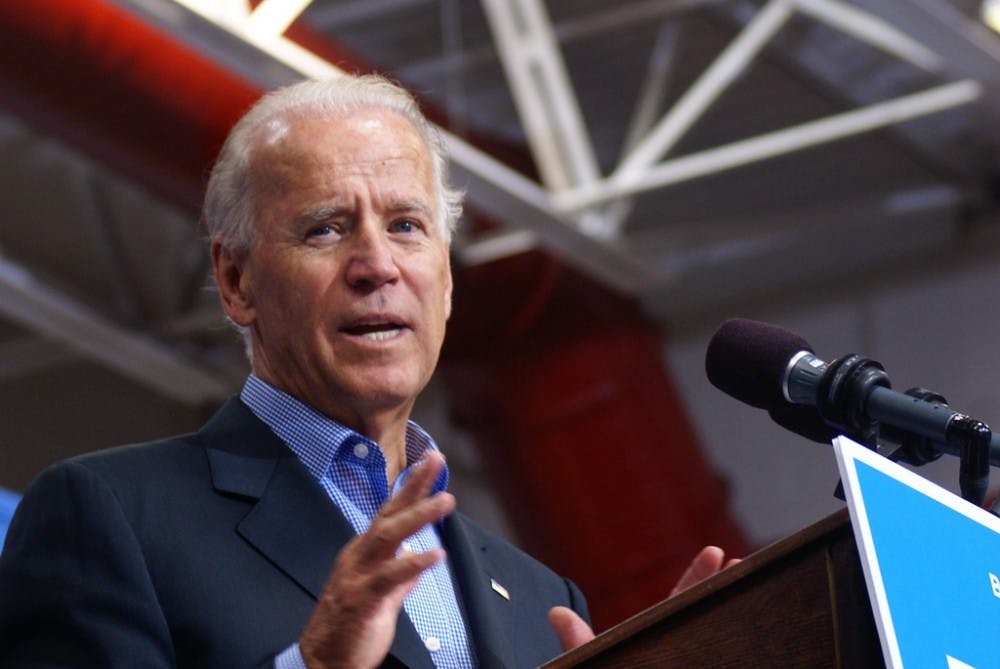Princeton students are young. Our leading presidential candidates are not. With that fact in mind, it is crucial that we examine who might best represent us on the national stage in 2020.
Media attention has largely circled around the top four candidates, who are polling fairly far ahead of the others: Joe Biden, Elizabeth Warren, Bernie Sanders, and Pete Buttigieg. With the exception of Buttigieg, the leading candidates have something in common: they are all in their seventies.
In a Presidential race, how old is too old? Should we use age as a factor in casting our vote in the primaries? Though age alone does not determine fitness for office, I believe that we should assess candidates’ physical and mental abilities.
The leading candidates are aware of how their age may affect voter perceptions — and this is nothing new. In the 2016 Presidential campaign, Hillary Clinton suffered from a bout of pneumonia but did her best to keep it secret. And, during the subsequent debates, she made a pointed effort not to drink water for the entire 90 minutes for purposes of appearance.
During the current race, Sanders suffered a heart attack, thus prompting a recent debate question on age and how it could limit the candidates. The older candidates on stage went out of their way to emphasize their vigor and commitment, as if to compensate for their age.
More important than physical ability, however, is mental acuity. According to research, adults over 70 often suffer delays in executive function, visual perceptual ability, memory, and language recall. All these skills, especially executive function, which governs decision-making ability and responsiveness, are foundational to being an effective president and ought to be a baseline necessity when we consider candidates. In terms of age, Sanders is 78 years old; Biden, 77; and Warren, 70. Sanders and Warren, however, are both distinguished by their energy and vociferous stage appearances, and neither has suffered any clear mental lapses in the public eye.
This is additionally remarkable considering the back-to-back, cross-country campaigning both candidates undertake, not to mention the draining endurance challenges in which they participate, such as Elizabeth Warren’s selfie lines, which frequently last over four hours.
On the other hand, Biden has shown significant lapses during his campaign. A simple web search pulls up dozens of compilations of Joe Biden memes and mess-ups on stage and in various speeches. From confusing Iraq and Afghanistan to repeatedly saying that his administration would keep on “punching at it and punching” at the problem of domestic violence, Biden frequently and inadvertently calls into question his mental fortitude.

And, whether or not these gaffes are a definite corollary of his age, they mark him as possibly unfit to converse and negotiate effectively with world leaders. Furthermore, it isn’t really likely that Biden will improve from this point but will rather deteriorate further.
Arguably, a leader of poor mental acuity is right before our eyes. Donald Trump figures as a flagrant instance of power mixed with senescence. Many experts have suggested the possibility of dementia or other mental issues; not only would such a condition logically make Trump unfit for the job, but could constitute a Constitutional ground for removal via the 25th Amendment. Even to an unqualified observer, the President’s seemingly arbitrary and emotionally-motivated actions suggest something else could be going on.
Although Biden, Warren, and Sanders are unlikely to go down quite the same road as Trump, the issue of capacity and ability remains important. If any of them lose their grip, it could have serious implications for the country and its international relations.
Though I am a big fan of Warren, and sometimes of Sanders, I have begun looking more closely at younger candidates such as Pete Buttigieg. At 37 years old, he may bring a lot more energy and mental clarity to the table than some of his competitors, with the added benefit of being a bit more moderate. And, he may be more relatable to younger generations.

As Princeton students, we are from a very different generation than these three candidates or Trump. We should consider age because candidates should be relatable to the voters whose support they seek. With a 50-year age gap, Biden in particular has shown himself to be out-of-touch with younger voters. These candidates are laying the groundwork for the future society in which our generation will be active members, and arguably, it is increasingly difficult for someone with such an age gap to align closely with our own goals and ideas.
Some have raised the possibility of imposing an age limit on the Presidency, but I think such a step may be unwise. Although, as discussed above, individuals past the age of 70 may experience cognitive decline, that does not mean every person over that age would be unfit for the role.
Perhaps Warren and Sanders do indeed have the vigor to successfully complete a term; it would be ageist to eliminate that opportunity for them. Nevertheless, it is important to think more critically about the limits imposed by an aging mind on our future President’s capacities.
Emma Treadway is a sophomore from Cincinnati, Ohio. She can be reached at emmalt@princeton.edu.








